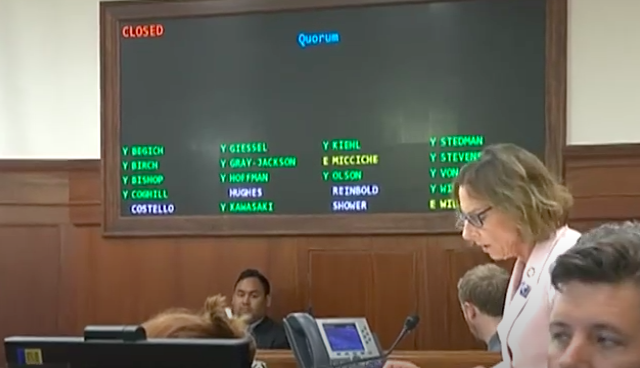The MRAK
Almanac is your place for political, cultural, and civic events, events where
you’ll meet political leaders or, if you are interested in getting to know your
state, these are great places to meet conservative- and moderate-leaning
Alaskans.
Alaska Fact Book:
Question: The fires this summer seem especially bad around the entire state. Is this the worst fire season we’ve seen?
Answer: Not quite. The 2004 wildfire season was by far Alaska’s worst summer on record for fires. Almost seven million acres of land burned from over 700 separate fires—and 426 of these were started by humans. This season, around a million acres have burned so far, but with thunderstorms and more dry conditions in sight for Alaska’s interior, we may not get a respite from the smoke anytime soon. It’s still early, by fire season standards.
You can keep up with statewide fire updates at the Alaska Wildland Fire Information website, at this link.
7/10: The Alaska House and Alaska Senate are set to meet in joint session at 11:30 am to consider Governor Dunleavy’s vetoes of the FY2020 operating budget. Who will show up? Only time will tell. It’s likely the joint session will be live streamed at this link.
7/10: Concerts in the Plaza live music in downtown Fairbanks. Runs from 7 pm to 8 pm in the Golden Heart Plaza. If that doesn’t sound like enough fun, there will also be free ice cream.
7/10: Mat-Su Miners baseball game in Palmer at the Hermon Brothers Field. First pitch at 7 pm. Tickets are $4. Come support your favorite local team.
7/10: Last Day for Juneau’s City Clerk to certify initiative or referendum petitions for submission to the Juneau Assembly.
7/10: Veterans Town Hall meeting in Anchorage at the Alaska VA System offices on Muldoon Road. All veterans and their families are invited to attend and share their experiences and frustrations with the VA System in Alaska. Begins at 5 pm. Read more here.
7/10: Wasilla Farmer’s Market from 10 am to 6 pm at Iditapark. Bring the whole family and enjoy fresh local produce and unique treats.
7/10: Guided tours of the UAF Geophysical Institute in Fairbanks, one of the world’s leading arctic research centers. Read more here.
7/10: State Land Sales Auction in Anchorage. Downtown at the Robert Atwood Building, starting at 10 am. Read more about available land here.
7/10: Thought the rallies were done for the week? There will be an Override the Vetoes Rally in Fairbanks at the Golden Heart Plaza downtown. It’s an early start—8 am. You may catch a glimpse on your way to work.
7/10: Small Business Administration business roundtable in Anchorage. If you own or operate a small business in Alaska and have had or currently face issues with federal regulations on small businesses, this event is for you. Starts at 9 am at the Alaska Small Business Development Center, 1901 Bragaw St in Anchorage. Registration is required, more information here.
7/10: The Ketchikan City Council will hold a special meeting at 6 pm to discuss the reconfiguration of the Port of Ketchikan. Read the agenda here.
7/10: Swan Lake Fire community meeting at Cooper Landing Elementary School at 6 pm. Crew members and fire officials will update concerned citizens on their progress in containing the fire. More details here.
7/10: Regular meeting of the Skagway Borough Assembly, gaveling in at 7 pm. The assembly will be discussing their search for a new city manager as well as considering the renewal application for the Remedy Shoppe marijuana store. Read the agenda here.
7/10: Those interested in running for local office in the City of Wasilla can pick up filing packets at the City Clerk’s office starting today. Read more here.
7/10: Town meeting in Wrangell to discuss water conservation and management strategies. The public is invited to attend—your input is needed. Read more at this link.
7/10: Are you curious about Fairbanks’ own Chena River? A U.S. Fish and Wildlife official will be giving a public lecture at the UAF Murie Auditorium on the history of the Chena River and Chena Slough. Free and open to the public, Facebook link here.
7/10: Concerned about crime in Anchorage? The Anchorage Assembly’s Public Safety Committee will meet at 11 am, and the public is invited to attend. Read the agenda here.
7/10: Hazmat Day 2019 in Palmer at the Mat-Su Solid Waste Division. Residents of the Mat-Su Borough may drop off up to forty pounds of hazardous household waste free of charge. Eligible items include acids, oils, gasoline, paint thinner, brake fluid, and many other substances that must be disposed of properly. Further details here.
7/10-7/12: Alaska Marijuana Control Board (MCB) meeting in Fairbanks in the FNSB assembly chambers. The board will hold further discussion on state on-site consumption rules, as well as hear updates on taxing and enforcement. Dozens of new applications will also be considered by the board. See the full agenda here.
7/10-7/14: 34th annual Bear Paw Festival in Eagle River. There will be rides and amusements for the kids, vendors, live music, and even a talent show. Sponsored by the Chugiak-Eagle River Chamber. See the full schedule here.
7/11: Alaska Aviators Forum with pilot Marie-Claire LeBerge, the daughter of two aviators and a current ferry pilot who spends her days flying over much of North America. Begins at 7 pm at the Alaska Aviation Museum. Facebook link here.
7/11: Regular meeting of the Soldotna City Council at 6 pm. Read the agenda here.
7/11: Interior Alaska Food Network monthly meeting at the Fairbanks Community Food Bank. Begins at 1 pm. Further details here.
7/11: The Houston City Council will gavel in for a regular meeting at 7 pm. On tap for Thursday evening is public testimony on the renewal application for a local cannabis dispensary, as well as a rezoning ordinance. Read the agenda here.
7/11: Grand “Re-Opening” at the Salvation Army on Dimond Blvd. in Anchorage, which has been closed for repairs since the earthquake last winter. Read more here.
7/11: 59th Signal Battalion Change of Command ceremony at JBER. Event begins at 3 pm at the Otter Lake Recreation Area. Facebook link here.
7/11: Volunteer opportunity at Jewel Lake Park in Anchorage. Interested residents may show up at 5:30 pm and help landscaping crews in mulching around plants and generally improving a beloved local park. Pizza provided for those who help out. Further details here.
7/11: Alaska Bikers Advocating Training & Education (ABATE) monthly meeting in Anchorage. Last meeting before the annual Christmas in July Toy Run. Facebook link here.
Alaska History Archive:
July 9, 1958—61 years ago: The now infamous Lituya Bay earthquake and mega-tsunami struck in present-day Glacier Bay National Park. Though the 7.8 magnitude of the earthquake was not extraordinary, the massive landslide and resulting wall of water certainly was. The tremor caused 90 million tons of rock to fall into the shallow bay in a matter of seconds, unleashing a giant tsunami that completely destroyed the surrounding forests up to an elevation of about 2,000 feet. The effects can still be readily observed today.
July 10, 1913—106 years ago: The highest ambient (air) temperature ever recorded on the surface of the earth occurred in Death Valley, California. The National Weather Service recorded an official temperature of 134 °F. While not explicitly Alaska related, residents may find this historical tidbit interesting in the midst of such an extreme heat wave over much of the state.









